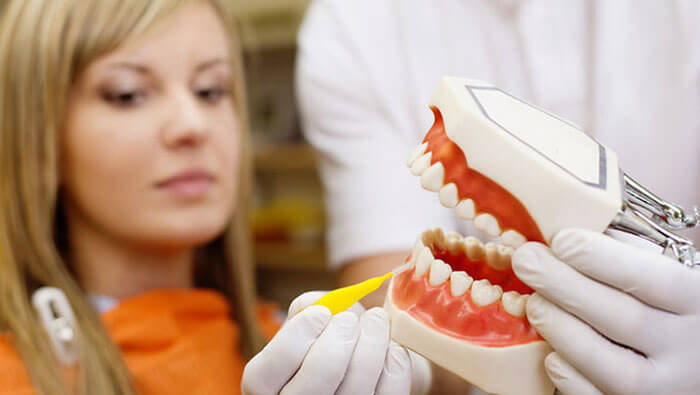How freely you flash your pearly whites is a quick window into your confidence and self-esteem. There are a lot of factors — from cosmetic to urgent — that can undermine that confidence and cause you to hide your teeth behind pursed lips or the back of your hand.
A serious concern for many of us – one that has both functional and cosmetic implications – is fragile, brittle teeth. Many people struggle with teeth that are weaker than they used to be, or more brittle than they should be. Weak, brittle teeth can interfere with your ability to eat, laugh, and live confidently. You may be contributing to that weakness by some bad habits, or you may be the victim of factors beyond your control. Regardless, Soundview Family Dental can help you prevent and bounce back from fragile, brittle teeth.
Key Takeaways
- Brittle teeth can result from genetic factors, periodontal disease, osteoporosis, renal disease, and certain medications.
- Multiple factors like acidic/sugary diets, poor nutrition, dental procedures, and personal habits can contribute to weakened teeth.
- Managing brittle teeth involves good oral hygiene, avoiding acidic/sugary foods, proper nutrition, and seeking dental treatment.
- Soundview Family Dental offers treatment options like crowns and restorations for weakened teeth.
- Regular dental cleanings, appointments, and partnering with your dentist can help preserve tooth strength and function.

Why are my teeth breaking?
There are several known causes for brittle and fragile teeth, as well as other factors that are associated with an increased risk of easily broken teeth.
Genetic factors that affect your enamel and dentin can result in fragile teeth. Genetic predispositions may mean that you have softer than normal enamel, meaning it is more easily broken than for most people. Genetic factors may also affect the characteristics of the layer just beneath the enamel — the dentin — and may also mean your teeth are more brittle than normal.
Periodontal disease is often called gum disease. Whatever you call it, it is caused by bacterial growth that accumulates because of poor oral hygiene habits. The early form of periodontal disease — gingivitis — does not generally cause irreversible bone or tissue damage. However, if it is not treated effectively, and if you do not make a renewed commitment to good oral health, you can develop periodontitis. Periodontitis causes the retraction of bone and tissue from your teeth, which produces “pockets” at your gumline, which fill with debris and can lead to infection. In its advanced form, periodontitis results in fragile teeth that are prone to falling out. Make no mistake, periodontal disease is a serious condition, and should not be ignored.
Osteoporosis, which weakens the bones throughout your body, and renal disease, which affects your body’s ability to absorb calcium, can also contribute to brittle and fragile teeth.
Risk factors for brittle and fragile teeth
While these risk factors do not directly cause brittle and fragile teeth, they indirectly contribute to circumstances which can result in teeth that break more easily than they should:
Multiple and repeated dental procedures in individual teeth or the same area of your mouth or jaw can, ironically, result in weakened teeth over time. A series of cavities in the same area, fillings that have had to be repeated, or cavities and fillings in adjacent teeth can, over time, result in weakness. Weakness attributable to multiple and repeated dental procedures can be addressed by exploring alternative dental treatments — crowns instead of or in addition to fillings, for example.
Some medications indirectly contribute to making your teeth brittle or weak by inhibiting your ability to absorb calcium or to produce saliva. If you lack sufficient saliva in your mouth, you will suffer a loss of enamel which, in turn, makes you vulnerable to tooth decay and weakness that comes with it.
Your own personal habits can also increase the risk that you will suffer brittle or weak teeth. For example, it is possible to brush too often or too hard, which can wear away essential enamel. Over-the-counter whitening toothpaste (as opposed to professional-grade whitening toothpaste) can wear away your enamel, too. Also, if you experience sleep bruxism — the habit of clenching your jaw and grinding your teeth as you sleep — you may gradually weaken your teeth and suffer broken teeth and dental work.
Acidic and sugary diets and switching rapidly between hot and cold foods and drinks weakens teeth by exposing them to chemicals that degrade their integrity and too-quick cycles of expansion and contraction. And poor overall nutrition weakens all the tissues of your body, including your teeth.

How to treat and manage brittle teeth?
Now that you have a better understanding of some of the causes and risk factors for weak and brittle teeth, some of the ways of managing brittle teeth — or your vulnerability to weak teeth — may be becoming clear.
Since tooth decay advances to the point of periodontal disease is a significant problem, a commitment to daily oral hygiene habits, and to twice-annual teeth cleanings and dental appointments, will help preserve the strength and integrity of your teeth. Your dentist will spot potential issues and develop a treatment plan to halt issues before they become significant risks.
Along the same vein, you can preserve the strength of your teeth and reduce the risk of weakness or brittleness by avoiding acidic and sugary foods or, if you cannot resist, emphasizing excellent oral hygiene immediately after indulging. Commitment to good overall nutrition for the sake of your general health will also contribute to stronger and less brittle teeth.
At Soundview Family Dental, we will partner with you to reduce the risk of brittle teeth, and to offer treatment alternatives that prioritize preserving your natural tooth function. If for whatever reason your natural teeth are no longer able to support your oral needs, we can offer options for this, too.
If successive cavities in the same area of your mouth have contributed to weakness, we may recommend crowns or other restorations to protect your teeth and restore full function. If you are experiencing tooth weakness due to periodontal disease, we will provide non-surgical (cleaning, scaling, and planing) and surgical (pocket reduction, bone and tissue grafts, tissue regeneration, and bone surgery) to halt the disease and preserve teeth strength. If you have a badly infected tooth, we will recommend painless root canal surgery capped with a crown to prevent that tooth from breaking or becoming reinfected.
Finally, in the unfortunate but possible event that some natural teeth are simply not strong enough to support your dental function and lifestyle, we will provide dental implant options to eliminate any fear that your teeth will crack, split, or break at any time.
Conclusion
You can do many things to keep your teeth as strong as possible — including keeping them as clean as possible and keeping us as involved in your oral health as possible. If you are experiencing repeated cavities in the same cluster of teeth, the need for frequent fillings in the same area, easily chipped or cracked teeth, broken teeth, tooth decay, advancing gingivitis, or tooth loss — regardless of how any of those issues were caused — Soundview Family Dental can provide preventive and restorative solutions. Our goal is simple — to preserve and return your teeth to their rightful place in your confident and healthy smile.
Are your teeth more brittle or fragile than they used to be? Or weaker than they need to be for you to eat, laugh, and live confidently? Please reach out and let us take a look and offer some suggestions and solutions.


